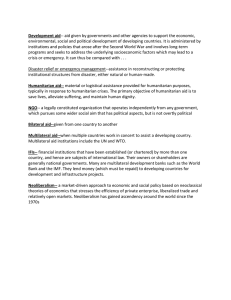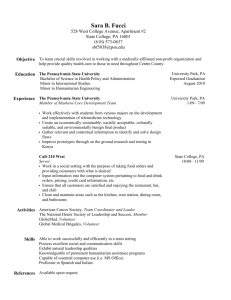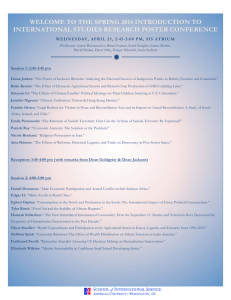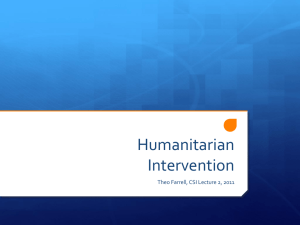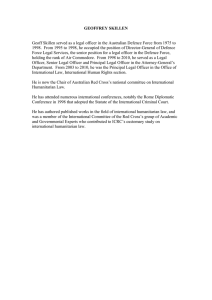HUMANITARIAN INTERVENTION
advertisement
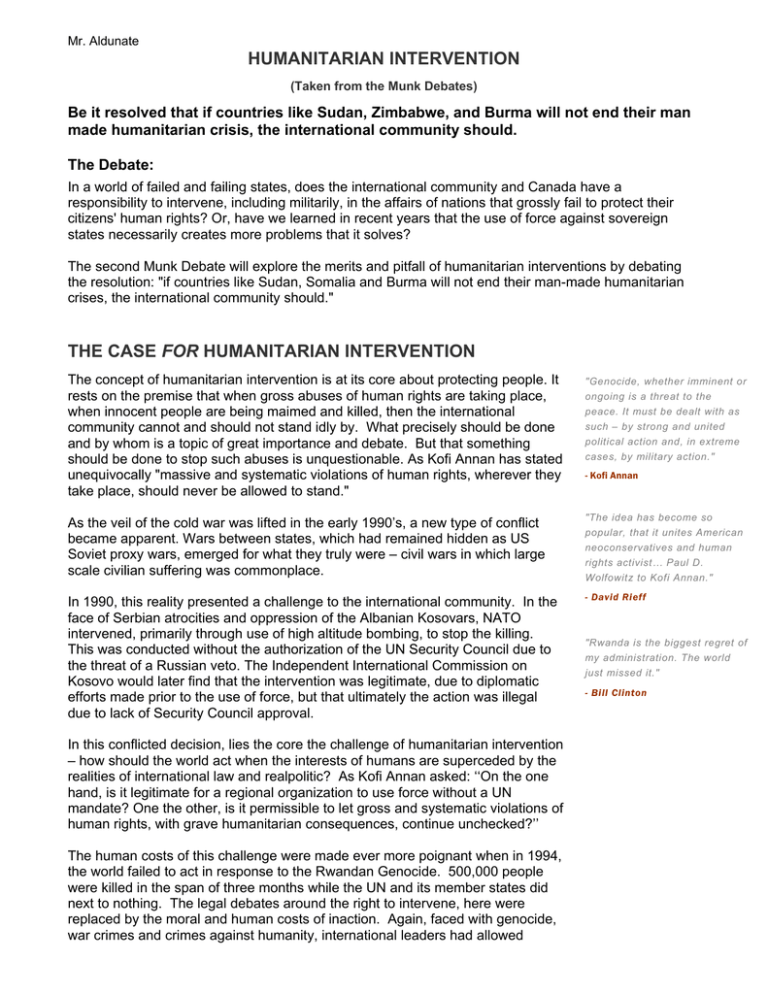
Mr. Aldunate HUMANITARIAN INTERVENTION (Taken from the Munk Debates) Be it resolved that if countries like Sudan, Zimbabwe, and Burma will not end their man made humanitarian crisis, the international community should. The Debate: In a world of failed and failing states, does the international community and Canada have a responsibility to intervene, including militarily, in the affairs of nations that grossly fail to protect their citizens' human rights? Or, have we learned in recent years that the use of force against sovereign states necessarily creates more problems that it solves? The second Munk Debate will explore the merits and pitfall of humanitarian interventions by debating the resolution: "if countries like Sudan, Somalia and Burma will not end their man-made humanitarian crises, the international community should." THE CASE FOR HUMANITARIAN INTERVENTION The concept of humanitarian intervention is at its core about protecting people. It rests on the premise that when gross abuses of human rights are taking place, when innocent people are being maimed and killed, then the international community cannot and should not stand idly by. What precisely should be done and by whom is a topic of great importance and debate. But that something should be done to stop such abuses is unquestionable. As Kofi Annan has stated unequivocally "massive and systematic violations of human rights, wherever they take place, should never be allowed to stand." "Genocide, whether imminent or ongoing is a threat to the As the veil of the cold war was lifted in the early 1990’s, a new type of conflict became apparent. Wars between states, which had remained hidden as US Soviet proxy wars, emerged for what they truly were – civil wars in which large scale civilian suffering was commonplace. "The idea has become so In 1990, this reality presented a challenge to the international community. In the face of Serbian atrocities and oppression of the Albanian Kosovars, NATO intervened, primarily through use of high altitude bombing, to stop the killing. This was conducted without the authorization of the UN Security Council due to the threat of a Russian veto. The Independent International Commission on Kosovo would later find that the intervention was legitimate, due to diplomatic efforts made prior to the use of force, but that ultimately the action was illegal due to lack of Security Council approval. In this conflicted decision, lies the core the challenge of humanitarian intervention – how should the world act when the interests of humans are superceded by the realities of international law and realpolitic? As Kofi Annan asked: ‘‘On the one hand, is it legitimate for a regional organization to use force without a UN mandate? One the other, is it permissible to let gross and systematic violations of human rights, with grave humanitarian consequences, continue unchecked?’’ The human costs of this challenge were made ever more poignant when in 1994, the world failed to act in response to the Rwandan Genocide. 500,000 people were killed in the span of three months while the UN and its member states did next to nothing. The legal debates around the right to intervene, here were replaced by the moral and human costs of inaction. Again, faced with genocide, war crimes and crimes against humanity, international leaders had allowed peace. It must be dealt with as such – by strong and united political action and, in extreme cases, by military action." - Kofi Annan popular, that it unites American neoconservatives and human rights activist… Paul D. Wolfowitz to Kofi Annan." - David Rieff "Rwanda is the biggest regret of my administration. The world just missed it." - Bill Clinton sovereignty to trump humanity. Following the legal dilemma of Kosovo, the failures of the Rwandan Genocide, and the humanitarian disasters of the Somalia and Bosnia and Herzegovina, the Canadian Government established the International Commission on Intervention and State Sovereignty (ICISS) and asked it to explore when, if ever, the international community has the right to intervene in a sovereign state in the name of humanitarian protection? "At the end of the day the case for R2P rests simply on our common humanity: the impossibility of ignoring the cries of pain and distress of our fellow human beings." Made up of prominent international human rights leaders, the commission came up with a novel approach. In their final report, “The Responsibility to Protect”, they shifted the question from when the international community has the right to intervene, to who has the responsibility to protect civilians from gross abuse. The Responsibility to Protect (R2P) is first, of course, placed on the sovereign state. But sovereignty is conditional on providing this protection. If a state is unable or unwilling to protect its population, or is itself the cause of the threat, the international community has a responsibility to protect those populations against genocide, war crimes, ethnic cleansing, and crimes against humanity. The ICISS also outlined a number of threshold conditions that must be met before sovereignty could be breached by military intervention. They include a just cause defined by high losses of life, right intention, last resort, proportional means, reasonable prospects of success, right authority granted by the UN Security Council, and clear operational objectives. The notion of a state’s sovereignty being conditional on an ability and willingness to protect its citizens was re-affirmed in 2004, in the Secretary General’s High-Level Panel on Threats, Challenges, and Change, which endorsed R2P as an emerging norm. The concept was official affirmed by the UN in the 2005 World Summit Outcomes document which stated that UN had the responsibility protect populations from genocide, war crimes, ethnic cleansing, and crimes against humanity. In so doing, the last hurdle to the legality of humanitarian intervention had been overcome. Since 2005, a clear case of the Responsibility to Protect has emerged. While the international community was signing the R2P into UN protocol, the genocide in Darfur was emerging as the first genocide of the 21st century. Despite much talk, little has been done to halt the killing, and the concept of R2P, so lauded in the halls of the General Assembly, has yet to be applied to save the over 200,000 people who have so far been killed in Sudan. - Gareth Evans "'The news media's silence is reprehensible. If we knew as much about Darfur as we do about Michael Jackson, we might be able to stop these humanitarian disasters." - Nicholas D. Kristof "Where a population is suffering serious harm, as a result of internal war, insurgency or repression the principle of nonintervention yields to the responsibility to protect." - ICISS "The children started jumping out of the windows of the classes, when they saw the 'Janjaweed' coming. They were shooting the children who were trying to run away." - Hikma, teacher in the village of Kidinyir, Darfur The case for humanitarian intervention in Darfur is clear. First, the conflict threatens regional stability. When humanitarian crises are left unsolved, they ultimately spread to neighbouring countries, destabilizing a region, leading to further conflict in neighbouring states, and threatening even more people. Second, we have a moral obligation to protect the hundreds of thousands who are risk. Third, the Sudanese government, through its complicity in the genocide, has clearly forfeited its right to sovereignty. Finally, we have a responsibility to right the wrongs of the western colonial legacy in Africa. And herein lies the crucial point. The debate over humanitarian intervention should not be whether it is necessary – there is no question that it is – but rather who is going to finally act to stop the unnecessary killing. It is more intervention that is needed, not less. Source: http://www.munkdebates.com/ THE CASE AGAINST HUMANITARIAN INTERVENTION There is no doubt that the moral case for humanitarian intervention is convincing. Who would not want to help those in dire need? The reality, however, is somewhat more complex. More often than not, the use of force for humanitarian purposes simply causes more problems than it solves. "Our position is clear, that what has been going on is not a genocide, this is an American attempt to use a humanitarian situation for a political agenda." The myriad of arguments against humanitarian are as diverse as their wide array of proponents - from radical leftists to isolationist conservatives, from African development workers to Chinese leaders. All caution against promoting a practice whereby militaries are used, countries are invaded and wars are waged in the name of humanitarianism. - Dr Mustafa Osman Ismail, Sudanese foreign minister There are eight diverse arguments against humanitarian intervention. American approach to "After September 11, the humanitarian intervention First, humanitarian wars are rarely, if ever, fought for purely humanitarian reasons. National interest is almost always a critical factor governing the motives of the intervening states. More often than not, geopolitics rather than human interests drives humanitarian intervention. In Kosovo, for example, there were clear NATO interests at stake. In Rwanda there were not. There are two costs to the role of national interest in humanitarian operations. First, if the primary interest is geopolitical, rather than humanitarian, then the means of force used will bias the former over the latter - such as the near exclusive reliance of airpower in Kosovo. Second, states that intervene for purely humanitarian reasons quickly lose interest and go home (such as is Haiti, Somalia); those that stay almost always have dubious motives. Second, humanitarian intervention is a guise for a new era of colonialism, driven by a neo-liberal agenda. Rationalized through the theory of a 'liberal peace' - that countries with open markets and democratic governments won't go to war - proponents of intervention have replaced the colonialist goal of "civilizing" the third world, with the humanitarian goal of freeing the developing world from human right abuses. The result is that the economic order promoted and established by the intervening powers, often works against the interests of those the intervention was meant to protect. morphed into post hoc rationalizations for uses of force." - Richard Falk "The project of the humanitarian interventionists is a new colonial order." - David Reiff "Nato is willing to kill for peace, but not die for peace" - Gwynne Dyer "'Humanitarian bombing'. It is difficult to concoct a nicer oxymoron." Third, breaches of sovereignty in the name of humanitarianism erode the principle of sovereignty that has successfully governed the world since the Treaty of Westphalia in 1648. This has two costs. First, it diminished the authority of the entity best suited to protect the interests of humans. Intervention delegitimizes the very body that for the past 400 years, has been the single best protector of human wellbeing - the nation state. Second, humanitarian intervention sets a very dangerous precedent for future violations of the principle of national sovereignty. Just because we may think a breach of sovereignty was appropriate in Kosovo, would we feel the same way if Russia invaded Georgia to "protect" the peoples of South Ossetia? Or China, to "protect" the Taiwanese? Fourth, the problems in many of the conflicts in which proponents would like to see us intervene, are either the direct or indirect consequence of European colonialism and Western inference to begin with. Whether in Colonial Africa, in shaping the borders of the Middle East or in fueling the proxy wars of the Cold War, the "west" has been at the root of many of the wars they now use as a rationale for further interference. Perhaps it is time we stay away. - Paul de Rooij "The West's conception of humanitarian intervention is so ideologically biased that the 'silent genocide' of death through poverty and malnutrition is rendered natural and inevitable." - Nick Wheeler "Iraq shows the dangers of the humanitarian rationale. It can so easily be used to justify any violation of national sovereignty to promote the interests of an Fifth, the principle of humanitarian intervention have been co-opted as a Trojan horse for US imperialism. In both Iraq and Afghanistan, humanitarian external force." - Walden Bello rationales have been evoked to justify what are clearly being fought for US, rather than humanitarian interests. As Richard Falk states "After September 11, the American approach to humanitarian intervention morphed into post hoc rationalizations for uses of force otherwise difficult to reconcile with international law. There is no doubt that the Iraqi people have been liberated, although for what remains obscure." "States that intervene for purely humanitarian reasons quickly lose interest and go home; those that Sixth, it is sometimes better to let a conflict run its course, than to prematurely step in and stop it. As political scientist Edward N. Luttwak has noted "Although war is a great evil, it does have a great virtue: it can resolve political conflicts and lead to peace." Humanitarian interventions often impose short term solutions to trump real long term peace and stability. Seventh, with regard to the Responsibility to Protect. Once we open the vault of intervention, where does the "responsibility" end? For example, R2P has already in its short life, been cited as a reason to: invade Iraq; to protect the artifacts in the National Museum in Iraq; to implement stringent domestic counterterrorism policies in the US; as a reason to stop Iran from processing enriched uranium; and, to use force for the promotion of democracy. While the intentions of R2P may be sounds, it has already been used to rationalize profoundly un-humanitarian acts. stay almost always have dubious motives." - Ronald Steel "Foreign policy must return to what it traditionally has been: the diplomatic aspect of national security rather than a branch of Holocaust studies." - Robert Kaplan Finally, and perhaps most importantly, humanitarian interventions often do more harm than good. In, fact, they often result in precisely what proponents say they are meant to prevent - gross violations of human rights and international law. Militaries, no matter what their mission, will fight to win. The process of winning a war, will often make the humanitarian situation worse in the short term. This is exacerbates by our unwillingness to take casualties. A recent air strike in Afghanistan killed 90 civilians. In what way is this act "humanitarian"? In Kosovo, a reliance on airpower, while ultimately successful in achieving a military victory, provoked the Serbs to accelerate their murder and displacement of Albanian Kosovars. While few of these argument may be convincing on their own, and there are surely no individuals who would agree with all of them, together, they offer an overwhelming caution for those who seek the wider use of force in the name of humanitarian interests. The world would be far safer, and people more secure, if less intervention took place, not more. Source: http://www.munkdebates.com/ Aspirations don't make foreign policy JOHN BOLTON Globe and Mail We owe them protection November 3, 2008 The central problem with the case for humanitarian intervention is that the arguments advanced in its favour are largely incoherent. All will agree that there are situations of human suffering that deserve attention, but most are far removed from even the most expansive definition of “national interests.” What's more, proponents of interventionism rarely explain to the citizens of countries like Canada why their sons and daughters are to be put in harm's way, albeit for noble purposes. So, what precisely are these advocates proposing to do, and what is the utility in grouping such disparate examples together under the label of humanitarian intervention? Proponents are never sure who they are going to save, but consider the situations in Sudan, Somalia and Burma. In Sudan, we see a genocidal civil war. What began as a conflict between the government and the indigenous population in Darfur now risks spreading to the neighbouring countries of Chad and the Central African Republic. Hundreds of thousands of people have died. In Somalia, there has been a near-complete breakdown in central government authority. In the south, this has resulted in fractious warlordism. In the north, in Puntland and Somaliland, we see a state of near secession. For almost 20 years, the country has verged on anarchy. In Burma, a long-standing dictatorship has recently blocked international humanitarian assistance following a major natural disaster. There is no doubt that thousands died unnecessarily due to the inaction of the military junta. Each of these cases represents a humanitarian crisis, but the circumstances vary dramatically. What precisely do advocates of intervention wish to be done in each of these vastly different situations? More importantly to the debate about humanitarian intervention, what clarity is there in lumping them together under one set of norms and actions? Secondly, what do advocates of humanitarian intervention mean when they say the “international community”? Is it the United Nations we are speaking of? If so, the UN's track record on each of the aforementioned countries is hardly reassuring. On Sudan, UN authorization of an African Union peacekeeping force has faced constant obstruction in the Security Council. China and Russia have threatened vetoes at every step - why would anyone think they will change their ways? As for Somalia, in the early 1990s, the United States intervened unilaterally to try and open the channels of humanitarian assistance, but within two years of turning the mission over to the UN, the country had again descended into chaos. Why would the UN do better in Somalia this time than it did last time? Where Burma is concerned, the Bush administration fought hard just to get its discussion on the Security Council's agenda. We ultimately prevailed, but it was certainly not easy, and the resulting council action was marginal. Are these three cases emblematic of the much vaunted “international community?” Third, I have found that many who advocate the doctrine of “responsibility to protect,” and particularly military intervention, are very casual with other people's blood. It is much easier to advocate for the use of force when you are not the one doing the heavy lifting. The reality of international military capabilities is that when observers on the sidelines express high ideals for what the international community should be doing, they are generally referring to the United States. And as tragic as the situation is in Darfur, in a democracy we have to be able to explain to American citizens why they should put their sons and daughters at risk where there are no vital U.S interests, even in an area of undoubted humanitarian tragedy. There has been much talk about creating a standing volunteer rapid response force that can act in the name of the “responsibility to protect,” but this force will be faced with the very same logistical restraints as any national army. If under the UN, it will be subject to all of the UN's limitations. Once deployed, it is entirely unclear how the “rapid response” force would ever be able to extract itself from what are often intractable, long-term conflicts. I am afraid that in the end, the principle of the responsibility to protect remains fundamentally aspirational. And aspirations do not make a foreign policy. John Bolton is former U.S. ambassador to the UN, and a participant in the Dec. 1 Munk Debate on humanitarian intervention (www.munkdebates.com). MIA FARROW Globe and Mail November 3, 2008 At 6 a.m. on Aug. 25, Kalma camp, home to 90,000 displaced Darfuris, was surrounded by Sudanese government forces. By 7 a.m., 60 heavily armed military vehicles had entered the camp, shooting and setting straw huts ablaze. Terrified civilians - who had previously fled their burning villages after being attacked by this same government and its proxy killers the janjaweed hastily armed themselves with sticks, spears and knives. Of course, these were no match for machine guns and automatic weapons. By 9 a.m., the worst of the brutal assault was over. The vehicles rolled out leaving scores dead and more than 100 wounded. Most were women and children. The early-morning time of the attack ensured no aid workers were present as witnesses. Doctors Without Borders did, however, manage to negotiate the transportation of 49 of the most severely wounded to a hospital in the nearby town of Nyala. How can such brazen cruelty be inflicted upon our fellow human beings? How is it that a military assault on displaced civilians in a refugee camp creates barely a ripple in the news cycle? How does such outrageous human destruction prompt so little outrage? How is it that those who have been tasked with protecting the world's most vulnerable population have failed - and failed, and then failed yet again - in their central responsibility? What does this say about the United Nations and the powerful member states? How have we come to such a moment? Such questions can be answered by looking at our response to Darfur's agony over the past six years. Any honest assessment would be as shocking and dispiriting as the assault on Kalma itself. The international response to massive crimes by Sudanese President Omar al-Bashir and his cabal has been simply this: We accommodate and acquiesce, with the contrived hope that these tyrants might grow weary of their task, or that paper agreements can somehow have meaning without a sustained and powerful international commitment backing them. The Kalma massacre is a part of Khartoum's larger genocidal campaign. Since 2003, 80 to 90 per cent of Darfur's African villages have been destroyed, and more than 2.5 million survivors have fled to squalid camps across Darfur, eastern Chad and the Central African Republic. Hundreds of thousands have died. Khartoum's next goal may well be to shut down camps in Darfur and force people out into the desert where they cannot survive. The homes and fields that once sustained so many of Darfur's people are ashes now, or they have new occupants - Arab tribes from Darfur and as far away as Chad, Niger and Mali. The message of the Kalma massacre is chillingly clear for Darfuris. But this assault on civilians in full view of the international community raises the question of what the massacre says about the rest of us. The only message we have sent to the Sudanese government is that they can now attack refugee camps and the world will watch and do nothing. Smoothly, many in the international community lament Darfur's genocide but say that its solutions are beyond the boundaries of national interests and they invoke the concept of "national sovereignty." I contest that statement. The United Nations has, in 2006, clearly stated that the international community, through the United Nations, has the responsibility to "protect populations from genocide, war crimes, ethnic cleansing and crimes against humanity." "Responsibility to protect" means the international community must "react" when states are unable or unwilling to protect those living within their borders. The international action can be political, diplomatic, economic or military. The latter should be at the ready in "extreme and exceptional cases," which it defines as "cases of violence which ... shock the conscience of mankind." The responsibility to protect has redefined the concept of sovereignty by clearly stating that it involves not only the rights of nation states, but the responsibilities of civilian protection they bear. The responsibility to protect marks the end of centuries of inviolate borders and impunity within them. In principle. The reality is something else. Over my 10 trips to the Darfur region since 2004, I have seen men, women and children fleeing for their lives. In terror they fled their burning homes, in terror they endured the rapes and unthinkable atrocities. In terror and dread they await the next attacks. In terror they have waited for more than five unthinkable years for protection that has not come. Mia Farrow is an actor, activist and UNICEF Goodwill Ambassador, and a participant in the Dec. 1 Munk Debate on humanitarian intervention (www.munkdebates.com).
